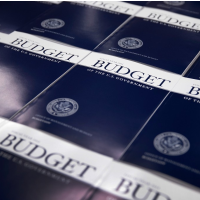Republican Lawmakers Take Heat for Rejecting Obama’s Final Budget Sight Unseen
 (photo: Win McNamee, Getty Images)
(photo: Win McNamee, Getty Images)
By Jackie Calmes, New York Times
WASHINGTON — President Barack Obama sends Congress his eighth and last annual budget proposal on Tuesday, a lame-duck executive’s accounting of national priorities that Republican leaders have branded sight unseen: dead before arrival.
But some new ideas that the administration previewed in recent weeks, including on cancer research, opioid abuse and military projects, could have more life than Republicans care to admit. A $10-a-barrel oil tax for infrastructure and clean transportation projects is certain to be too much for conservatives, but administration officials said some initiatives would prevail in some form.
Congressional Republicans went to new lengths to extinguish any such expectations. Breaking with a 41-year-old tradition, the Republican chairmen of the House and Senate budget committees announced that they would not even give the president’s budget director, Shaun Donovan, the usual hearings in their panels this week.
G. William Hoagland, who was the Republican staff director at the Senate Budget Committee for much of the 1980s and 1990s, and is senior vice president of the Bipartisan Policy Center, said he could not recall a year since the modern budget process took effect in the 1970s when a president’s budget director was not invited to testify before the budget committees.
“While the last budget of an outgoing president is usually aspirational, and sets a theme for what he or she hopes will be followed up by his or her successor, it nonetheless should be reviewed by the Congress,” Hoagland said.
On Monday, 14 Democrats on the House Budget Committee signed a letter calling the snub “disrespectful to the committee members, the public and the president.” And like Hoagland, other Republicans criticized the decision, which injects partisan toxicity early in a year of election pressures.
“I believe that permitting the administration the courtesy of explaining its intent and what it thinks of the policy should have been maintained,” said Douglas Holtz-Eakin, a former director of the Congressional Budget Office and an economic adviser to Republicans. Besides, he added, “it gives you an opportunity to express why you disagree.”
The rebuff of Donovan was at odds with the civility that House Speaker Paul Ryan of Wisconsin has sought, going back to his time as House Budget Committee chairman. A senior adviser to Ryan, Brendan Buck, said the speaker was informed before his committee successor, Rep. Tom Price of Georgia, issued the statement with his Senate counterpart, Sen. Mike Enzi of Wyoming, indicating Donovan was unwelcome.
“This was a decision made by the budget committee, but we support the chairman,” Buck said.
Price and Enzi said in their statement, “Rather than spend time on a proposal that, if anything like this administration’s previous budgets will double down on the same failed policies that have led to the worst economic recovery in modern times, Congress should continue our work on building a budget that balances and that will foster a healthy economy.”
But some of the president’s spending priorities are shared by key Republicans, including senators seeking re-election in swing states. Those include $1 billion to research cures for cancer and another $1 billion over two years to expand treatment for people addicted to prescription opioids or heroin.
When Obama took office in 2009, the country was in a recession and running the first annual deficit exceeding $1 trillion, and unemployment reached 10 percent.
Since then, annual deficits have been cut by three quarters to 2.5 percent of gross domestic product, which is below the level that most economists find troublesome. The jobless rate has been cut by more than half, to 4.9 percent. Contributing to the decline of deficits were bipartisan spending caps, the economic recovery and the end of some Bush-era tax cuts.
Obama’s budget will project, as the Congressional Budget Office recently did, that the deficit will begin rising again this year, several years sooner than expected. The budget office concluded the main reason for the increase is Congress and the president’s agreement in December to permanently extend a raft of temporary tax cuts for corporations and individuals without offsetting budget savings. The president had proposed closing some tax breaks, but Republicans oppose tax increases.
Obama’s budget once again will emphasize domestic programs, recycling initiatives that he would offset with increased taxes from the wealthy and some corporations.
New ideas he has previewed include:
— A state-based system of wage insurance to replace up to half of workers’ wages if they lose a job or are forced to take lower-paying employment.
— A $2 billion pilot program testing state and local innovations for aiding families in distress, for example because of job loss, serious illness or substance abuse.
— Financial incentives for states that have not yet expanded their Medicaid programs to cover many more uninsured workers.
— Expanded options for tax-favored retirement savings for workers at small businesses.
— $12 billion over 10 years to expand food benefits for poor children in the summer, when they do not receive free or subsidized school meals.
— A reduced version of the so-called “Cadillac tax” on employer-provided insurance plans, which was designed to control health spending but proved highly unpopular with unions and both parties.
- Top Stories
- Unusual News
- Where is the Money Going?
- Controversies
- U.S. and the World
- Appointments and Resignations
- Latest News
- Trump to Stop Deportations If…
- Trump Denounces World Series
- What If China Invaded the United States?
- Donald Trump Has a Mental Health Problem and It Has a Name
- Trump Goes on Renaming Frenzy






Comments